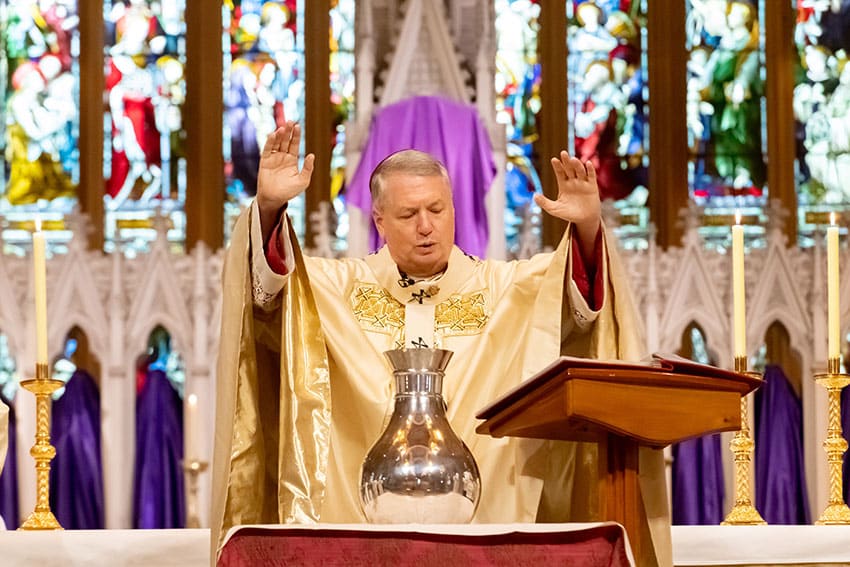
I occasionally hear the word “epiclesis” when people are talking about the liturgy. What exactly is this?
The word “epiclesis” is Greek and it means literally “to call down upon.” It refers in the liturgy to calling upon God, and in particular the Holy Spirit, to come down upon a person or a thing to consecrate or bless it.
The catechism, in the section on the Holy Spirit in the liturgy, says of it: “The Epiclesis (“invocation upon”) is the intercession in which the priest begs the Father to send the Holy Spirit, the Sanctifier, so that the offerings may become the body and blood of Christ and that the faithful, by receiving them, may themselves become a living offering to God” (CCC 1105).
The gesture the priest uses in the epiclesis consists in holding his hands, palms down, over a person or thing, while invoking God or the Holy Spirit to come down. Thus, whenever the priest uses this gesture he is, at least in the broad sense, doing an epiclesis.
He does this, for example, in the blessing of the water for baptism, in the solemn blessing at the end of Mass and in the nuptial blessing in a wedding.
There is also an epiclesis in such sacraments as confirmation and holy orders, as well as in the sacrament of penance, and in many common blessings.
The principal epiclesis is that in the Mass which, in the Latin rite, comes just before the consecration.
The General Instruction of the Roman Missal says, while listing the main elements of the Eucharistic Prayer: “The epiclesis, in which , by means of particular invocations, the Church implores the power of the Holy Spirit that the gifts offered by human hands be consecrated, that is, become Christ’s Body and Blood, and that the unblemished sacrificial Victim to be consumed in Communion may be for the salvation of those who will partake of it” (GIRM 79, c).
All the Eucharistic prayers have an epiclesis. In the first Eucharistic prayer, the most ancient one because it goes back to the early centuries of the church, the priest calls on God while holding his hands, palms down, over the gifts and saying: “Be pleased, O God, we pray, to bless, acknowledge, and approve this offering in every respect; make it spiritual and acceptable, so that it may become for us the Body and Blood of your most beloved Son, our Lord Jesus Christ.”
In Eucharistic prayer II the words are: “Make holy, therefore, these gifts, we pray by sending down your Spirit upon them like the dewfall, so that they may become for us the Body and Blood of our Lord Jesus Christ.”
In Eucharistic prayer III: “Therefore, O Lord, we humbly implore you by the same Spirit graciously make holy these gifts we have brought to you for consecration, that they may become the Body and Blood of your Son our Lord Jesus Christ, at whose command we celebrate these mysteries.”
In Eucharistic Prayer IV: “Therefore, O Lord, we pray: may this same Holy Spirit graciously sanctify these offerings, that they may become the Body and Blood of our Lord Jesus Christ for the celebration of this great mystery which he himself left us as an eternal covenant.”
In the Eastern rite liturgies, the epiclesis comes after the consecration. The most common Byzantine rite liturgy is that of St John Chrysostom, which is used by many of the Eastern Orthodox Churches and by many of the Eastern Rite Catholic Churches, including the Melkite and Ukrainian.
In the liturgy of St John Chrysostom, the priest says: “Again we offer you this spiritual and unbloody worship, and we ask and pray and entreat: send down your Holy Spirit upon us and upon these gifts here offered.”
The deacon says: “Bless the holy bread, Father,” to which the priest responds: “And make this bread the precious Body of your Christ.” The deacon asks the same for the chalice, and the priest says: “And that which is in this cup the precious Blood of your Christ.”
The deacon then says: “Amen. Bless both, Father” and the priest responds: “Changing them by your Holy Spirit.” The deacon concludes: “Amen, Amen, Amen.”
